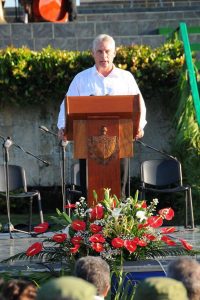Sentir Bolivariano
Adán Chávez Frías
@adancoromoto
¡Váyanse al Carajo, Yanquis de Mierda!
I
Hacemos un alto, por ahora, en las reflexiones que hemos venido realizando en artículos anteriores acerca de nuestra primera vida junto al Comandante Chávez, dada la necesidad de referirnos a la nueva arremetida del gobierno supremacista de Donald Trump contra el Pueblo de Venezuela y sus instituciones; una acción que se inscribe en los permanentes esfuerzos que realiza el decadente imperio norteamericano por tratar de dar al traste con el proyecto de amplias transformaciones que las venezolanas y los venezolanos hemos venido desarrollando desde el año 1999, cuando el líder histórico de la Revolución Bolivariana asumió por vez primera la Presidencia de la República.
Frente a esta prolongada y brutal arremetida, antes como ahora, el Gobierno y el Pueblo Bolivariano han mantenido una firme posición de defensa de la soberanía e independencia nacional, el bien más preciado que hemos reconquistado después de 200 años, como lo expresara el Comandante Chávez en el Plan de la Patria; una posición que ha sido consecuente, además, cuando la estabilidad de otros países hermanos de Nuestra América Latinocaribeña, ha sido amenazada por quien insiste en vernos como su patio trasero.
II
Recordemos como el líder histórico de la Revolución Bolivariana anunció el 11 de septiembre del año 2008, en un acto de presentación y apoyo a las candidatas y los candidatos del Partido Socialista Unido de Venezuela (Psuv) a la Gobernación y Alcaldías del estado Carabobo; que el Gobierno Bolivariano otorgaba un plazo de 72 horas al entonces embajador gringo en Venezuela, Patrick Duddy, para que abandonara nuestro país; ordenando, al mismo tiempo, el regreso inmediato a la Patria del compañero Bernardo Álvarez, quien se desempeñaba como Embajador ante Washington.
El Comandante Chávez adoptaba esta medida en solidaridad con el hermano Pueblo boliviano y el compañero Presidente Evo Morales, cuyo gobierno mantenía una dura disputa diplomática con el de Estados Unidos, por su intromisión en los asuntos internos de ese país, como suele ocurrir, en apoyo a los sectores de derecha arrodillados a los designios imperiales. Tanto La Paz como Washington habían expulsado a sus respectivos representantes diplomáticos.
Así, durante la intervención a la que acabamos de hacer mención, nuestro Comandante Eterno expresó: “Váyanse al carajo yanquis de mierda, que aquí hay un Pueblo digno…aquí estamos los hijos de Bolívar, los hijos de Guaicaipuro, los hijos de Tupac Amarú, y estamos resueltos a ser libres…Si viniera algún país, si viniera alguna agresión contra Venezuela, pues no habrá petróleo para el Pueblo ni para el gobierno de los Estados Unidos, nosotros, yanquis de mierda, sépanlo, estamos resueltos a ser libres, pase lo que pase y cuéstenos lo que nos cueste…”. Sin duda, un mandato del Comandante Chávez que sigue totalmente vigente.
III
Y es que el Comandante Chávez fue un vehemente defensor de la dignidad nacional y latinocaribeña, amenazada permanentemente por el enemigo histórico de nuestros Pueblos; aún en tiempos en los que la humanidad entera libra una batalla sin precedentes en los últimos años, en los que seguimos siendo objeto de la saña yanqui, caracterizada en este momento por la profundización de la guerra económica y las amenazas de invasión militar contra el país, y por la pretensión de aplicarle la “fórmula Noriega” al Presidente Maduro y otros dirigentes de la Revolución Bolivariana.
Ahora bien, es cierto que después del golpe de Estado del año 2002, contra el Gobierno Bolivariano dirigido por el Comandante-Presidente Hugo Chávez, la inmensa mayoría de las venezolanas y los venezolanos -fundamentalmente la clase trabajadora, las campesinas y los campesinos de la Patria-, fortaleció sus convicciones revolucionarias, defendiendo frente a cada arremetida del peligroso vecino del norte, el proyecto de transformaciones profundas propuesto por el líder histórico de la Revolución Bolivariana; hoy bajo la conducción del compañero Presidente Nicolás Maduro.
Por supuesto, ello no significa que se resolvieron los problemas propios de la lucha de clases presentes en la sociedad; y que el camino de allí en adelante haya sido llano y sin tropiezos. Sabemos que no ha sido así, y que nuestro Pueblo, con un alto grado de organización y consciencia, ha venido enfrentando diversos obstáculos, entre los cuales están las situaciones generadas en el país después del resultado de las elecciones parlamentarias de diciembre de 2015.
De allí que, ante un previsible escenario de continuidad de la agresión gringa, y a pesar de lo mucho que hemos avanzado hasta ahora; necesario es seguir fortaleciendo nuestra consciencia del deber social, a objeto de que no tengan cabida alguna las deserciones, las divisiones y los antivalores con los que las fuerzas contrarevolucionarias pretenden debilitar a ese Pueblo organizado y consciente; que seamos capaces de derrotar definitivamente el egoísmo, el individualismo y el reformismo; y de blindarnos frente a la brutal campaña antibolivariana desatada por las grandes corporaciones mediáticas mundiales.
Toca, además, fortalecer el rol del Partido Socialista Unido de Venezuela (Psuv) y del Gran Polo Patriótico; y, de manera particular, de las y los dirigentes de la revolución, en la orientación y la formación debida del heroico y patriota Pueblo venezolano. El papel de la vanguardia revolucionaria, que orienta, dirige y aprende en la práctica conjunta; es clave.
En definitiva, resulta necesario aprovechar la coyuntura que estamos viviendo, ante la feroz arremetida del imperio, para continuar consolidando nuestro movimiento cívico-militar, cada vez más enraizado en el ideario bolivariano y chavista. Es el momento de actualizar permanentemente nuestro plan estratégico para cambiar la sociedad heredada, en lo teórico y en el programa de acción socialista; para que hierva con más fuerza la sangre rebelde en nuestras venas y consciencias. Apliquemos, con todo lo que signifique, las tres “R” al cuadrado que nos legó el Comandante Chávez; en cuya defensa de su legado siempre Venceremos.

